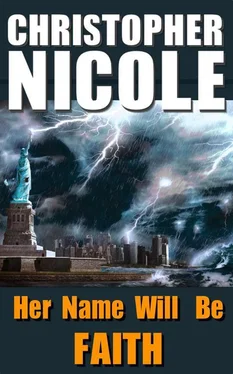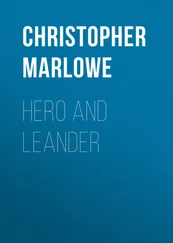Naseby looked down at the ruins beneath him. “Yeah,” he said. “But I didn’t make that decision, Mr President. At least, not until it was forced upon me. The evacuation was ordered by a television weatherman, Richard Connors, on his own initiative. Because he knew what was coming, and the rest of us wouldn’t believe him.”
“Then Connors is someone I’d like to meet,” the President said. “Or is that confidential?”
“I think Mr President is asking, Bill, if you are going to tell that fact to the voters,” the Governor put in.
Naseby grinned. “I’ll have to think about that. But I sure intend to tell Mr Connors, supposing I can find him.” He looked down at the city again. “And supposing he’s alive.”
SUNDAY 30 JULY: Afternoon
“Yeah,” Mark Hammond said into his radio. “She’s clear of land and heading off to Newfoundland. Winds dropping all the time. Round the center they’re 80 miles an hour. I guess by tonight you’ll be able to downgrade her to a storm. That’s Faith, Doctor. We’re heading back to base.”
He turned the aircraft, allowing it to sink lower as he did so. They left the still turbulent mass of white behind them and dipped into clear skies with only little balls of cotton wool floating gently around and above them as they descended.
“Still some sea running,” Landry commented, looking down at the whitecaps and the waves, flattened by the angle but still clearly several feet high, surging up the Gulf Stream.
“Yeah,” Mark agreed. “I don’t give much for the chances of any ship caught out in that. Home, boys, where the sun shines all the time.”
“Hold it.” Mackenzie had come up to join them on the flight deck and was using binoculars. “There’s something down there.”
“Where?”
“I’ve lost it now. But there was something. Let’s make a sweep, skipper.”
“One sweep,” Mark grunted. He, and all his crew, were suffering from exhaustion and lack of sleep. Mackenzie was probably hallucinating.
“There it is,” Landry said.
“Show me.” Mark swung the plane again.
“Look,” Mackenzie said.
“Take her,” Mark told Landry, and leveled the binoculars. By now they were only 500 feet above the waves, and following Mackenzie’s pointing finger he saw the sudden spurt of orange amidst the blue and white. “That’s a life raft.”
“And there are men in it,” Mackenzie said.
Landry had dropped to 300 feet, and now they could clearly see the bodies draped across the half collapsed raft — the canopy had blown away and one of the compartments had deflated.
“Shit, what a position to be in,” Mackenzie commented. “You reckon those guys can be alive?”
“I reckon we’d better get a helicopter out here to find out,” Mark said, and thumbed his handset again.
In a remarkable two weeks life was heading back to normal. It would take months, years, completely to restore the city to its old, sleazy, greatness, but over the next two days, as soon as the worst of the debris was cleared away from the streets, tunnels and subways and all the bodies that were going to be recovered had been found, services were working again on a limited scale, and the airport runways repaired and re-opened. People began to pick up their lives again. With massive help pouring in, not only from the rest of the United States but from all over the world, disease was averted and the job of cleaning away the demolished buildings was facilitated.
As soon as it was safe to leave Park Avenue, Richard took Jo and the children to his apartment, which had remained undamaged, and there they spent the next few days, while the roads were being cleared and the cleanup got under way. The city was supplied with food and drinking water by the army, using great trucks and containers; it was rather like being under siege, but at least there was no danger involved. Jo did not attempt to explain her situation to Owen Michael and Tamsin, who did not question it. In the aftermath of such a catastrophe questions about personal relationships seemed for the moment irrelevant.
But once power was restored Richard felt it his duty to go back to work — broken arm in a sling — nothing further having been said about his dismissal, or indeed heard from JC at all. With the NABS building a shambles, news and weather reporting was to say the least, primitive, but a service was provided.
Jo knew she had to regain contact with the family, but the telephones were still out. She and the children returned to Park Avenue, and were overwhelmed with joy to find Washington back on duty, even if the place was more of a wreck than they remembered — but the building itself remained sound, and the repairmen were already at work. While the Cadillac was still in the garage, into which, miraculously, only a trickle of water had penetrated. Jo now discovered that Washington had a spare set of keys for it. She kissed him with relief. Sadly, he had no news of Florence, and in view of the total destruction of Coney Island the worst had to be supposed.
Nor was there any news to be had from Greenwich Village, where the destruction and loss of life had been massive; the entire area had been cordoned off by the army because bodies were still being recovered from the wreckage of houses and there the risk of disease had not yet been eradicated. “Next of kin will be informed as soon as identification can be made,” the major in charge told Jo. “If your sister-in-law is here, we’ll find her. But… you’d better pray she ain’t.”
Jo and the children called at the Profiles office and found it gutted and deserted, so they drove up to New Rochdale to collect Nana, then went on out to Bognor, which had been sideswiped by the storm but suffered no real damage; Faith, having turned north-east, had been losing force when she swept over Connecticut. The cottage was untouched save for fallen trees. It was a tremendous relief to find real normalcy at last. To walk from room to room, opening doors and windows to sunshine, to look at each room prettily arranged with pictures, and ornaments and undamaged furniture — drapes moving gently in the warm air. And clothes! Jo wanted to touch everything, flick electric switches to be sure they worked, check out the fridge and freezer…
She lifted the phone — and heard the dial tone. She wanted to scream with joy… then hesitated. But she had to find out. So she dialed.
Sally Davenport said, “Oh! Jo! Yes. I’ll just get Sam.” Her voice sounded quite odd.
But if Sam was back… Jo frowned, and waited.
“Jo? Are you at the cottage?” His voice sounded funny too.
“Yes.”
“Have you seen the folks?”
“No. I’m on my way over now.”
“Heck,” he said. “We’ve been trying to contact you for two days, but there was no way. Jo…”
“Who got ashore?” she asked in a low voice; the children were outside.
“It was a monster wave, Jo. I swear it must’ve been 60 feet high. We never stood a chance. Michael never stood a chance. He was on the helm and went overboard. Jo… he was great. To the very end he was great. A real hero. Without him, we’d have been done far sooner.”
“How many?” she asked again.
“The ship broke up. We couldn’t get Pete up in time… he had a broken shoulder. And I think Jon had already died; he’d been flung on the deck and hit his head. Larry, Mark and I got the life raft over, but it was torn apart by the wind and the sea, kept capsizing. We hung on, somehow, and gradually the seas started going down. We thought we were dead…”
“But you got ashore.”
“A helicopter came and winched us up. Seems we were spotted by a navy weather plane. Larry… Larry didn’t make it. Exposure, I guess. Mark’s okay…”
Читать дальше












